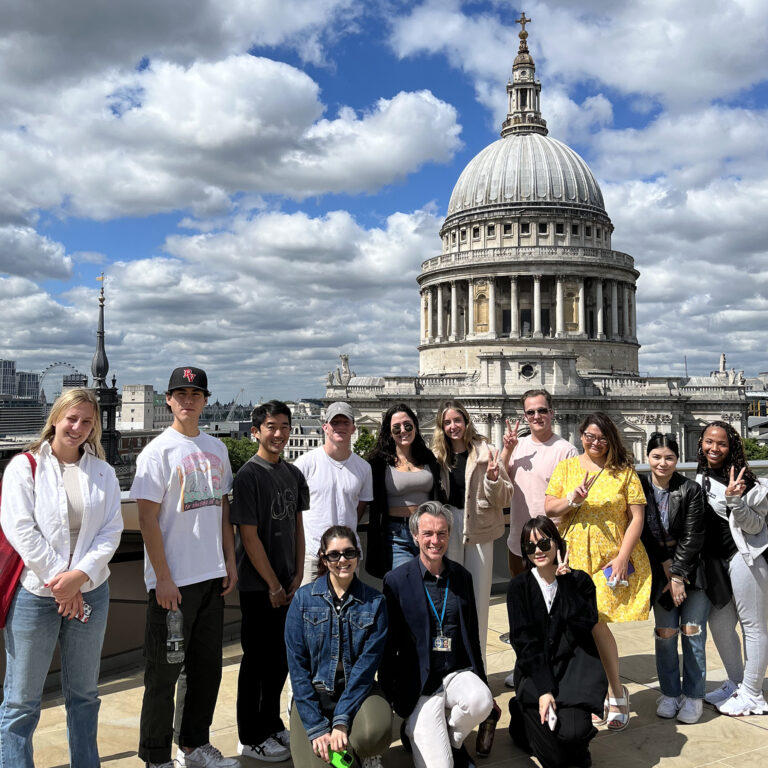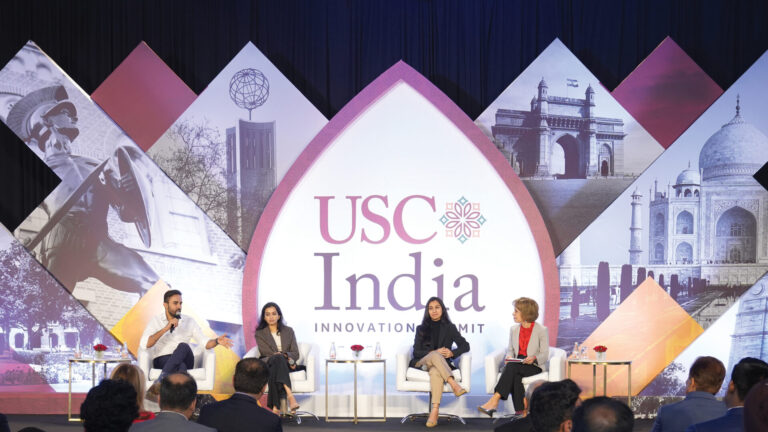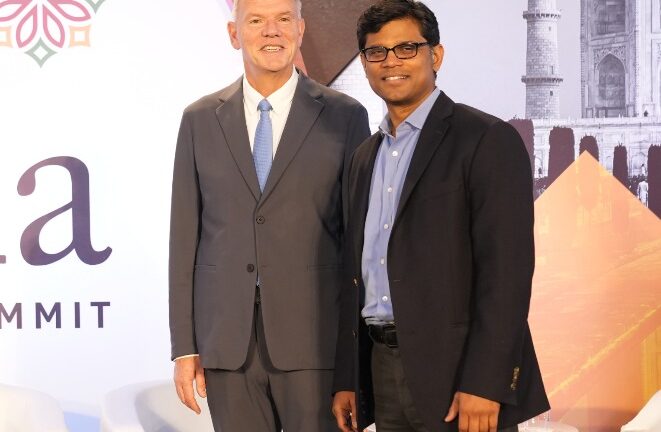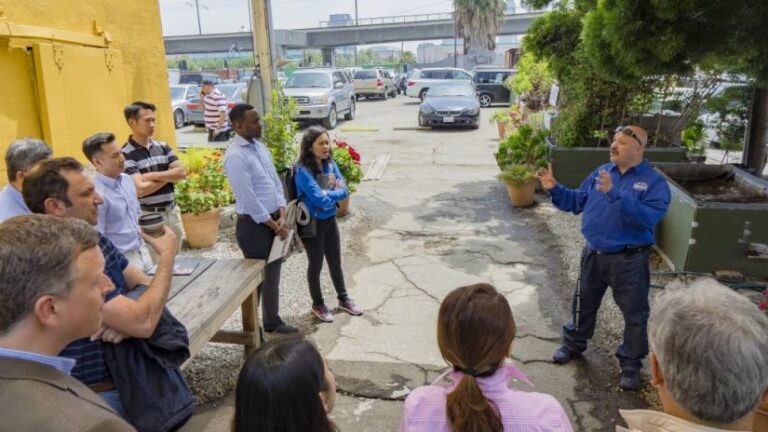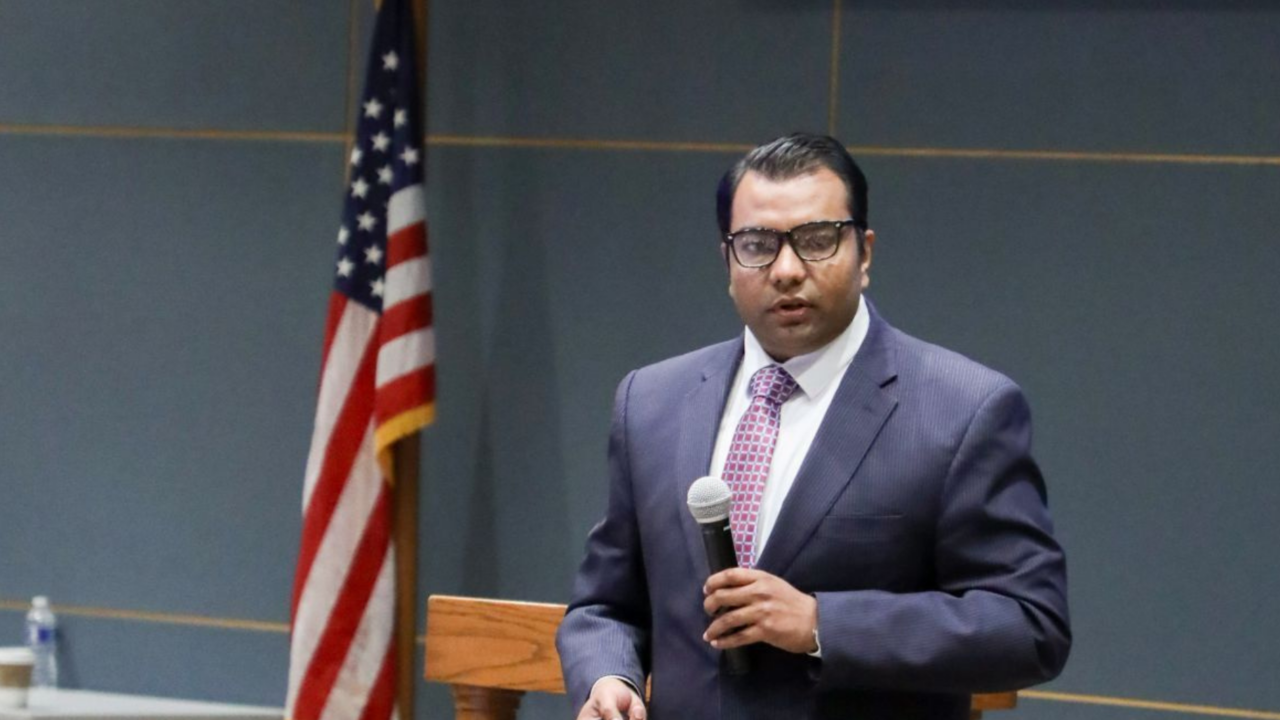
Photo: Courtesy of Vidhu Shekhar
USC Price Alumnus Improves Public Administration With Artificial Intelligence
As a Microsoft executive, Vidhu Shekhar uses his Master of Public Administration (MPA) to leverage AI and make government services smarter.
As government strategy leader at Microsoft, Vidhu Shekhar, MPA ’11, intersects the public and private sectors, fusing his expertise in policy, artificial intelligence and urban planning to enhance government services. But that wasn’t his original career plan. A native of the industrial city of Jamshedpur in eastern India, he grew up wanting to blend his creative and analytical skills with an interest in engineering to become an architect.
Then, while earning his bachelor’s, Shekhar journeyed to Scottsdale, Ariz., for an internship that changed his future. He worked at Acrosanti, the experimental community established by famed architect and urban planner Paolo Soleri as an environmentally sustainable alternative to sprawling cities. But as fulfilling as he found that nine-month experience, his real moment of change came during a meeting at the Scottsdale city manager’s office.
“I realized that I wanted to be on the city administration’s side of the table,” Shekhar said. So, upon returning to India to accept his bachelor’s in architecture, he began researching Master of Public Administration degrees. Although he considered programs in Australia, Singapore and across the U.S., one institution stood out: the USC Price School of Public Policy.
“Of the schools I was accepted into, USC Price was the most highly ranked,” Shekhar recalled. He was drawn to USC’s famous alumni network, commitment to mentoring and the career paths that the program would open up.
The school’s academic rigor impressed him as well. “I had some tough professors,” he admitted of his time at USC Price. “But they really helped me build a strong platform for the profession and to meet the field’s challenges.” For example, Shekhar noted that he still relies on what he learned about transportation policy from Genevieve Giuliano, now interim dean and Distinguished Professor of Public Policy and Ferraro Chair in Effective Local Government.
Other courses that Shekhar still finds impactful include environmental policy, taught by Research Professor Adam Rose, and organization development, taught by Associate Professor Peter Robertson.
Robertson also helped lead a 2010 Price International Lab to Rio De Janeiro, Brazil, that expanded Shekhar’s global experience. In conjunction with the partnering university Fundação Getulio Vargas, Shekhar and fellow students developed strategies to help the ministry of tourism prepare for the massive influx of visitors expected for the 2016 Summer Olympics. They addressed factors including financial and environmental concerns, safety, housing and transit.
“We did interviews over several days and then, in a 72-hour sprint, put together a plan that we presented to the secretary of tourism,” Shekhar recalled. “It was a very real-world example of how global management consulting firms examine and solve problems.”
It was also an example of the diversity of backgrounds and experiences that USC Price students bring to the program and its collaborations. “We get students from all over and from different points in their professional journeys,” Shekhar said — including current government officials. And he has developed lasting friendships with many of them.
One such connection Shekhar made at USC Price was deeper and more personal. He met his wife, Isako, in the program. “Talking about my USC journey is never complete without mentioning how lucky I was to meet my better half there,” he said. The couple has two young daughters, and Shekhar thinks they may want to attend USC as well — making them a true Trojan Family.
From his days as a student through today, Shekhar has continued solving problems. USC Price’s mentorship program connected him to an internship with Foothill Transit, a public agency operating more than 30 bus lines in Southern California. That experience — which included working with Google to add transit information to its Maps app — sparked his current passion for using advanced technologies to improve government agencies.
He built additional experience at Los Angeles World Airports and the L.A. District Attorney’s Office, where he helped update the evidence management system. He then began consulting for the powerhouse accounting firm KPMG. Shekhar’s stints as a consultant involved oversight, governance and program management for major technology projects across the western U.S.
“Given my breadth of experience in public administration, as well as a deep understanding of where technology can help governments take that next step in service delivery,” Shekhar noted it was only natural that he became the government strategy leader for Microsoft in the state capital of Sacramento. From there, he oversees the conglomerate’s use of AI to bolster the services of public agencies.
“People tend to look at governments as laggards in adopting new technology, but that discounts the complexity of their massive responsibilities,” Shekhar observed. “I mean, they’re dealing with everything from roads and utilities to infrastructure and disaster response.”
But even as he strives to expand AI’s applications, Shekhar emphasizes the importance of the human touch. “We need to have a partnership between people and technology,” he said.
To stay in touch with the human side of things, Shekhar is a committed volunteer, serving on the boards of organizations including USC’s Sacramento Center and the Sacramento Children’s Home.
“Coming into public administration after a career in architecture opened up so many different paths,” Shekhar said. “Through my experience at USC Price, I found myself in a whole new world where you can learn and pursue what you’re most passionate about.”
Learn more about the Master of Public Administration (MPA) program at USC Price School of Public Policy today.
